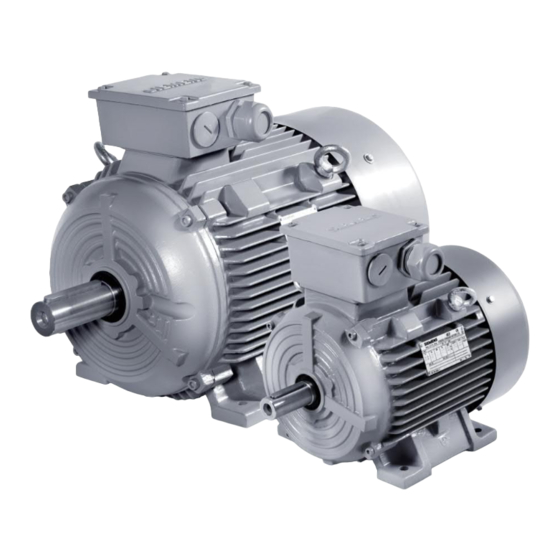
Table of Contents
Advertisement
Quick Links
Advertisement
Table of Contents

Summary of Contents for Siemens 1LE0
- Page 1 2020.09...
-
Page 3: Table Of Contents
Chapter 1.0 INTRODUCTION ....................4 1.1 Application Scope ..................4 1.2 Construction Type ..................4 1.3 Types of construction/method of installation ..........5 2.0 HANDLING AND STORAGE ................6 3.0 INSTALLATION AND COMMISSIONING............7 3.1 Installation....................7 3.2 Terminal Box ....................9 3.3 Balancing and Transmission Coupling ............9 3.4 Electrical Connection .............. -
Page 6: Handling And Storage
2.0 HANDLING AND STORAGE When lifting the motors, always use all lifting eyes provided. Prior to lifting the motor make sure that the lifting eyes are installed correctly and tightened. Never lift a motor using the rotor shaft and fan cowling. -
Page 7: Installation And Commissioning
3.0 INSTALLATION AND COMMISSIONING All work must be carried out by a skilled worker.Before starting any work, be sure to isolate the machine from the main and auxiliary power supply as applicable.Mains must be secured against accidental switch on. 3.1 Installation A fine foundation and exact installation is regarded as a basic requirement for coming long-time reliable working. - Page 8 3.1.3 Lifting eyes are screwed in place and must be tightened. If the motor is installed vertically with the DE shaft facing downwards, a protective canopy is recommended to cover the fan cowling. This canopy is necessary to prevent the ingress of water and foreign objects that may inhibit proper fan operation.
-
Page 9: Terminal Box
To ensure a quiet and vibration free operation, proper axial and radial alignment of a balanced transmission element (coupling, pulleys, fans, gear box, etc.) is essential. As standard, the 1LE0 rotors are dynamically balanced using a half feather key as indicated on the ratings name plate (H=Half Key). - Page 12 Note: by usage of 2 PTC, 1TP1 and 1TP2 are used for alarming, terminal 2 TP1 and 2TP2 are used for tripping . Motors operating in a wide temperature fluctuation environment are susceptible to condensation water. It is strongly recommended to use an optional heater (option code: Q04).
-
Page 14: Temperature Inspection
3.6 Temperature Inspection Temperature is an important reference index of motor running, the important parts for motor real- time temperature, the operation state, effective prevention of master motor fault, to ensure reli- able operation is very important. The motor temperature is influenced by cooling medium and environmental temperature. Measurement of motor winding temperature rise, usually embedded temperature measuring device (such as PT100), temperature measuring element through the lead wire connection control system, the motor temperature, or using the high precision of resistance method is founded. -
Page 17: Grease Type
Note Different brands and types of grease must not be mixed. -
Page 18: Re-Greasing Procedure
4.4 Re-greasing procedure Warning All local safety regulations must be considered when re-greasing the motor in operation or at a standstill. Care must be taken not to over grease the bearings as this can result in increased bearing temperatures. Dust and old grease must be prevented from entering the motor bearings during the re-greasing cycles. -
Page 22: Disposal
DISPOSAL Protecting the environment and preserving its resources are corporate goals of the highest prior- ity for us. Our worldwide environmental management system to ISO 14001 ensures compliance with legislation and sets high standards in this regard. Environmentally friendly design, technical safety and health protection are always firm goals even at the product development stage. -
Page 23: Preparing For Disassembly
6.3 Preparing for disassembly Disassembly of the machine must be carried out and/or supervised by qualified personnel with appropriate expert knowledge. 1. Contact a certified waste disposal organization in your vicinity. Clarify what is expected in terms of the quality of dismantling the machine and provision of the components. 2. - Page 24 Process materials and chemicals Sort the process materials and chemicals for recycling according to whether they are for example: ● Oil ● Grease ● Cleaning substances and solvents ● Paint residues ● Anti-corrosion agent ● Coolant additives such as inhibitors, antifreeze or biocides Dispose of the separated components according to local regulations or via a specialist disposal company.
- Page 26 All product designations may be trademarks www.ad .siemens.com.cn or product names of Siemens AG or supplier companies whose use by third parties for their own purposes could violate the rights of the owners.











